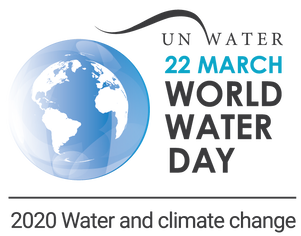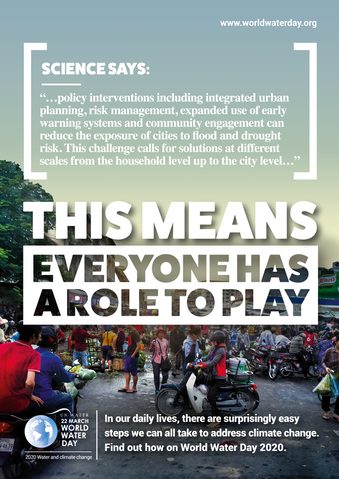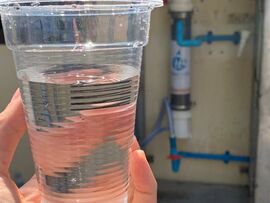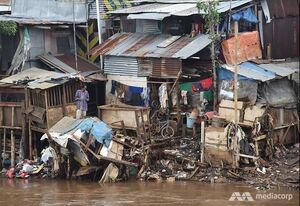|
On Sunday, March 22nd, the world will be celebrating World Water Day for the 28th year. This day is used to advocate the sustainable management of freshwater resources and the theme this year explores the intrinsic link between water and climate change.  What exactly is climate change? Climate change refers to the drastic weather and climate related changes occurring on Earth as a result of the recent rise in global temperature. The planet’s climate has changed constantly over time, however the current period of warming has irrefutable links to human behavior and has transitioned more rapidly than any past periods. This significant increase is occurring too quickly for living beings to adapt, and the impacts have been detrimental to both humans and wildlife. According to the United Nations (UN), climate change is the defining issue of our time and a pivotal moment for us. Climate change is happening as we speak, visible daily where temperatures have risen here in Singapore and many other parts of the world. 2019 was the hottest year recorded in Singapore, and the second-warmest year globally. Antarctica has also recorded it’s hottest temperature ever, reaching 20.75° C (69.35° F) in February. This region of the world is one of the fastest-warming, with an average increase of 3° C (5.4° F) according to the World Meteorological Organization. The UN has advised that we should be limiting global warming to 1.5°C to 2°C, however we are way off track to meet the climate targets that have been set! The annual global temperature in 2019 was 1.1°C warmer than the average for 1850-1900, and an increase to 5°C could occur in this century if we do not make changes now! This is extremely important as global warming causes extreme weather events, which in turn cause catastrophic natural disasters across the planet. Global warming vs. Climate change Before we go into detail on how natural disasters are linked to climate change, a frequently asked question is “what is the difference between climate change and global warming?” While these two terms are often used interchangeably, many of us do not know the key differences between their definitions.
 Natural disasters caused by climate change Now that we know the differences between the two terms, we can move on to a widely discussed issue of how exactly natural disasters are linked to climate change. Like its name suggests, natural disasters are bound to occur naturally, but climate change increases the intensity and/or frequency of these disastrous events. The number of climate-related disasters has tripled in the last 3 decades. A change in climate contributes to climate hazards and amplifies the risks that result from these extreme weather disasters. This means more violent cyclones, more extreme wild fires, and more severe droughts. Devastating floods have increased drastically, so we've written a blog on how to stay safe during a flood-related disaster. Click here to read more. Many of the catastrophic events that occurred last year were the result of weather pattern shifts, ultimately tied to climate change. Using climate models, scientists are now able to attribute specific disasters to climate change by analyzing simulations where variables related to the changing climate are removed. By comparing the results, scientists can identify which disasters are likely to have happened any way, and which may be a result of an affect like global warming. Aftermath of natural disasters The idiom, “after a storm comes a calm”, sadly does not fit in this narrative, as severe social and economic impacts arise from disasters. More often than not, the poorest and the most vulnerable are the most susceptible and the repercussions of such natural disasters can be detrimental. Sometimes communities haven't even recovered from one disaster before another one strikes. When such calamities happen, humans are on the receiving end. Basic necessities, like food, may be impossible to come by. Clean water becomes scarce; sanitation options become limited. With immediate action, these communities may be able to gain quick access to clean water for consumption, but even still, dirty or contaminated water may be used for all other activities, including hygiene, laundry, or even cooking. This can cause outbreaks of water-borne diseases, transmitted through a variety of ways. Although they may not be consuming the contaminated water directly, contact points like skin contact, bodily fluids and even fecal contact allow for the transmission of viruses and bacteria. This further emphasizes the importance of clean water in an emergency setting. We've written about viruses in water here and about clean water solutions during natural disasters here. What are we doing to combat climate change? Nations around the world have been pushing out plans and creating Acts to tackle this challenge. Put together by the parties of the United Nations Framework Convention on Climate Change (UNFCCC), the “Paris Agreement” was formed to combat climate change and to accelerate and intensify the actions and investments needed for a sustainable low-carbon future. Other countries like Indonesia, have committed to cut emissions by 29 percent from business-as-usual levels by 2030 under the National Action Plan on Climate Change Adaptation.
Government action alone will not be sufficient. Everyone has a role to play to promote sustainability and to mitigate climate change. We need to start worrying about climate change now and take action immediately! Although still nascent, we can already see the impacts global warming has caused to people around the world. Let us all do our part in fighting climate change to reduce the long-term consequences, ensuring that in the upcoming decades, the generations ahead are able to have a livable Planet Earth. Have you read our recent blogs? Sources: https://www.unwater.org/water-facts/water-sanitation-and-hygiene/ https://www.unwater.org/water-facts/disasters/ https://www.straitstimes.com/singapore/singapore-budget-2020-new-coastal-and-flood-protection-fund-to-protect-singapore-against https://climate.nasa.gov/resources/global-warming-vs-climate-change/ https://www.usgs.gov/faqs/what-difference-between-global-warming-and-climate-change-1?qt-news_science_products=4#qt-news_science_products https://www.climate.gov/news-features/climate-qa/whats-difference-between-global-warming-and-climate-change Blog Author: Joey Lim
Chief Editor: Michelle Falcone
0 Comments
Leave a Reply. |
Want more?Click below to see what other blog topics might peak your interest



Social Awareness Blog Archives
August 2022
|
- About Us
- Products
- Solutions
- Resources
- Get Involved
-
Blog
- The Global Water Situation
-
Facts about Water
>
- Water supplies for crisis
- WaSH During Emergencies
- Well Water Cleaning and Filtration Guide: Southeast Asia
- Gravity-fed Water Systems: Water Purification and Filtration setups in Southeast Asia
- A Guide to Rural Rainwater Harvesting and Filtering
- Water Shortages and Their Effect on Children in Rural Schools
- WaSH Planning and Design Framework Resources for Indonesia and the Philippines
- Rural Community Water Supply: Water Systems in Villages
- Info on our Products
- Impact Stories
- Upcoming & Past Events
- Contact
- Store
- About Us
- Products
- Solutions
- Resources
- Get Involved
-
Blog
- The Global Water Situation
-
Facts about Water
>
- Water supplies for crisis
- WaSH During Emergencies
- Well Water Cleaning and Filtration Guide: Southeast Asia
- Gravity-fed Water Systems: Water Purification and Filtration setups in Southeast Asia
- A Guide to Rural Rainwater Harvesting and Filtering
- Water Shortages and Their Effect on Children in Rural Schools
- WaSH Planning and Design Framework Resources for Indonesia and the Philippines
- Rural Community Water Supply: Water Systems in Villages
- Info on our Products
- Impact Stories
- Upcoming & Past Events
- Contact
- Store



.jpg)